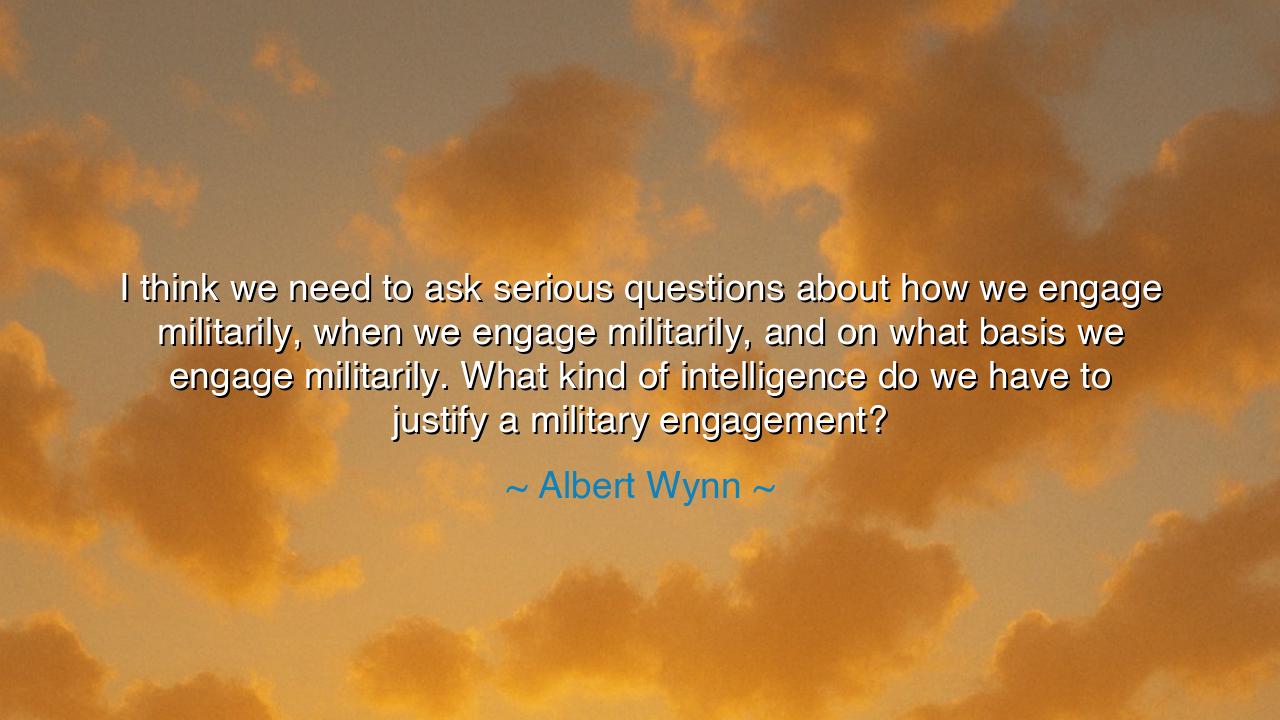
I think we need to ask serious questions about how we engage
I think we need to ask serious questions about how we engage militarily, when we engage militarily, and on what basis we engage militarily. What kind of intelligence do we have to justify a military engagement?






When Albert Wynn declared, “I think we need to ask serious questions about how we engage militarily, when we engage militarily, and on what basis we engage militarily. What kind of intelligence do we have to justify a military engagement?” he spoke not merely as a politician, but as a philosopher of justice and restraint. His words echo through the chambers of power like a solemn warning — that before a nation unsheathes the sword, it must first look into the mirror of its conscience. In this statement, Wynn urges the guardians of nations to remember that war is not merely an act of might, but a moral crossroads, and that intelligence, both in information and in wisdom, must guide the hand that holds the weapon.
The origin of this quote lies in the turbulent era following the wars of the early twenty-first century, when governments across the world wrestled with the aftermath of decisions made in haste and confidence. Albert Wynn, then a U.S. Congressman, spoke these words amid growing public unease about military interventions justified by flawed or incomplete intelligence. His voice joined the chorus of those who believed that power must never silence prudence. In his question — “What kind of intelligence do we have?” — lies a deeper call: to distinguish between knowledge and wisdom, between facts gathered by machines and truth discerned by conscience.
Throughout history, this tension between action and understanding has shaped the fate of civilizations. The Athenians, in their hunger for glory, marched upon Sicily during the Peloponnesian War, trusting the deceit of overconfidence rather than the counsel of reflection. The result was catastrophe — their fleet destroyed, their soldiers enslaved, their city humiliated. Centuries later, emperors and generals would make the same mistakes, launching wars without clarity of cause or comprehension of consequence. Wynn’s words stand as a modern echo of that ancient lesson: that the true strength of a nation lies not in the quickness of its sword, but in the depth of its deliberation.
To “ask serious questions,” as Wynn implores, is to perform an act of courage. For in times of fear and fervor, questioning becomes a form of rebellion. It is easy to march with the crowd when the drums of war are beating, but it is far harder to pause and demand truth. History has shown that falsehood and pride are as dangerous to a nation as any foreign foe. When intelligence is twisted to serve ambition rather than accuracy, when the cry for justice becomes a mask for conquest, the result is always suffering — both for the vanquished and the victor. Wynn’s warning is thus not only political but moral: that before unleashing destruction, a nation must ensure it stands upon the firm ground of truth.
The story of Dwight D. Eisenhower, a soldier who became president, serves as a mirror to Wynn’s wisdom. Having witnessed the horrors of war firsthand, Eisenhower cautioned against the unchecked growth of the military-industrial complex, warning that nations which live by the sword risk losing their soul to it. Like Wynn, he understood that military engagement must be guided by intelligence — not only of data, but of discernment. The strength to fight must be balanced by the wisdom to refrain. For even victory can become a kind of defeat if it severs a people from their moral compass.
In the style of the ancients, we might say that Wynn’s words are a call to temperance, one of the cardinal virtues. He calls not for weakness, but for measured power — the kind that honors life even in the face of conflict. The greatest warriors of old, from Sun Tzu to Marcus Aurelius, spoke the same truth: that the wise commander wins not by fighting every battle, but by knowing which battles to fight — and why. To engage without understanding is to fall prey to arrogance; to act without reflection is to sow the seeds of regret.
So, my child, learn from this teaching: before acting, always question. Whether in the councils of nations or the quiet decisions of your own life, let every engagement — physical, emotional, or moral — be weighed in the light of truth. Ask not only what you can do, but what you should do, and upon what foundation your actions stand. For wars are not waged only between armies; they are waged within the soul, between impulse and integrity. Let intelligence — the union of knowledge and conscience — be your guide, and you will walk the path of wisdom even through the battlefield of life.
For in the end, Albert Wynn’s message transcends politics and war. It is a reminder to all generations that the power to act must never outpace the wisdom to understand. Those who question before they strike, who reflect before they decide, are the true protectors of peace. Let the world remember: the sharpest weapon a nation can wield is not its arsenal, but its understanding — for it is understanding that turns strength into justice, and justice into lasting peace.






AAdministratorAdministrator
Welcome, honored guests. Please leave a comment, we will respond soon